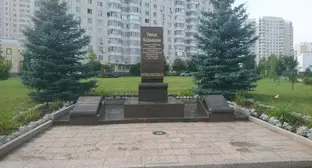20 October 2014, 09:00
Week in the Caucasus: review of main events of October 13-19
Public hearing at the ECtHR on human rights violations in the case on the terror act in Beslan in September 2007; changes in executive power of Volgograd Region; conviction of "Million Mask March" protesters in Yerevan; pardoning in Azerbaijan that affected four political prisoners; search for organizers of terror act in Chechnya; heavy rains in the Krasnodar Territory that caused flooding of some resort cities, – see the review of these and other events in the Caucasus during the week of October 13-19, 2014, prepared by the "Caucasian Knot".
ECtHR holds public hearing on terror act in Beslan committed in September 2007
On October 14, the European Court of Human Rights (ECtHR) held public hearings on the terror act in Beslan in September 2007, where 334 people were lost, including 186 children, and 810 others were injured. Relatives of the victims had appealed to the ECtHR asking to conduct an impartial investigation into all the circumstances of the terror act and the death of hostages, indicating violations by Russian authorities of their obligations under Article 2 (right to life) of the European Convention on Human Rights (ECHR). The case is named "Tagaeva and Others vs. Russia" – it unites seven complaints with a total of 447 applicants.
The focus of the ECtHR was on the measures taken by the authorities to prevent the terror act, and issues related to the indiscriminate use of weapons and planning the rescue operation. The applicants' representatives said that Russian authorities failed to take sufficient measures to protect people's lives and to conduct a proper investigation into the death of civilians. Georgy Matyushkin, the Deputy Minister of Justice, who was authorized to represent Russia at the ECtHR, stated, in his turn, that the investigation into the case was objective and impartial; while during the hostage capture the Russian Federation did not violate any victims' rights; and law enforcement bodies acted under the circumstances, given the fact that the situation was "non-standard". The ECtHR retired to make its decision on the case, which can be announced within a few months.
Volgograd Region changes the structure of its executive power
On October 16, the Deputies of the Volgograd Regional Duma adopted, in the first reading, two bills, changing the structure of the executive power in the region. The bills had been brought in by the Governor and assume renaming the government of the Volgograd Region into the administration of the region, and the ministries – into committees; the number of the bodies of the executive power will increase from 27 to 33. However, it is supposed to reduce the administrative expenses by 364 million roubles. The bills assume that the new structure will comprise 28 committees, three inspections, the Governor's office and the representative office of the Volgograd Region in Moscow. The members of the Regional Public Chamber were not unanimous in assessing the initiative of the new Governor of the region, stating that in the race for reducing the staff, one should keep in mind the capabilities of the remaining local officials to perform their functions.
Court in Yerevan convicts participants of "Million Mask March"
In Yerevan, on October 17, the court sentenced the participants of the "Million Mask March", which took place on November 5, 2013, and ended in clashes with the police. Shant Arutyunyan, the head of the "Tsegakron" Party, who organized the march, was sentenced to six years in prison. His son, the 15-year-old Schagen Arutyunyan, was sentenced to four years of conditional imprisonment. Other 13 activists were sentenced to punishments ranging from fines to seven years in prison on charges of resisting policemen with use of violence, and hooliganism. At the court session on October 16, the participants of the "Million Mask March" said that their march was directed against Armenia's accession to the Customs Union; and their position had caused their political persecution; they refused to admit their guilt. The advocates have announced their intention to appeal against the verdict. The Armenian National Congress (ANC) recognized Shant Arutyunyan and other participants of November 5 march as political prisoners.
Pardoning in Azerbaijan which affected four political prisoners
On October 17, on the eve of the Day of State Independence of Azerbaijan, celebrated on October 18, the Azerbaijani President Ilham Aliev signed a decree to pardon 84 people, including four persons recognized as political prisoners, namely, the activists of the "Nida" Movement Bakhtiyar Guliev, Shakhin Novruzlu and Elsever Mursalli, who in June and July this year submitted their petitions for clemency, made statements about quitting the "Nida" and supporting the policy of Azerbaijani authorities. Also, the pardoning covered Gasan Guseinli, the head of the non-governmental educational centre "Intellectual Citizen", acting in the city of Ganja. In early August, during the escalation of tension on the frontline in Nagorno-Karabakh, Guseinly issued a statement in which he called for the consolidation of the society around the government and urged not consider him a political prisoner. Human rights activists said, in their comments on the pardoning, that it had failed to solve the problem of political prisoners in Azerbaijan.
Chechen law enforcers search for possible persons involved in suicide bombing
In Grozny, on October 18, a special operation resulted in the killing of Aslan Aliskhanov, 33, a native of the capital of Chechnya, who was considered by the Chechen Ministry of Internal Affairs (MIA) to be the organizer of the terror act, committed in Grozny by a suicide bomber on October 5. Investigators have reported that on October 4 Aliskhanov tried to attack policemen in Grozny. It is noteworthy that last week, the investigating bodies of Chechnya reported that they had pre-established the persons involved in the October 5 suicide bombing; however, no names were revealed. Earlier, the bodies said they had identified the suicide bomber as Apti Mudarov, 19, a resident of the Staropromyslovskiy District of Grozny.
Last week, it became known about the detention of Apti's relatives: mother, uncle, sister and Mokhmad Yusupov, one of his close friends, who is currently undergoing training in one of the Islamic universities in Egypt. Also, all, who had been earlier acquainted with the alleged suicide bomber, were detained and interrogated. Also, reports appeared on the Internet about the involvement of the Islamist grouping JAMWA (Jaish al-Muhajireen wal-Ansar) in the suicide bombing; however, experts in Moscowdoubt that the statement is true.
Heavy rains in Krasnodar Territory cause flooding in some resort cities
On October 17-18, the KrasnodarTerritory was struck by heavy rains that caused accidents. In some districts of the city of Gelendzhik, the rainfall caused flooding and the need to evacuate local residents. Some streets of Krasnodar were also flooded. In Anapa, some private household territories also suffered from flooding. According to the city Mayoralty, within one day – September 18 – the city received a three-month norm of rainfall. On October 19, the Ministry for Emergencies (MfE) for the KrasnodarTerritory reported that in Anapa water had left the household territories. The authorities of Anapa and Gelendzhik decided to introduce the state of emergency in their cities; while the MfE announced an emergency warning due to bad weather in the Tuapse Region either.




